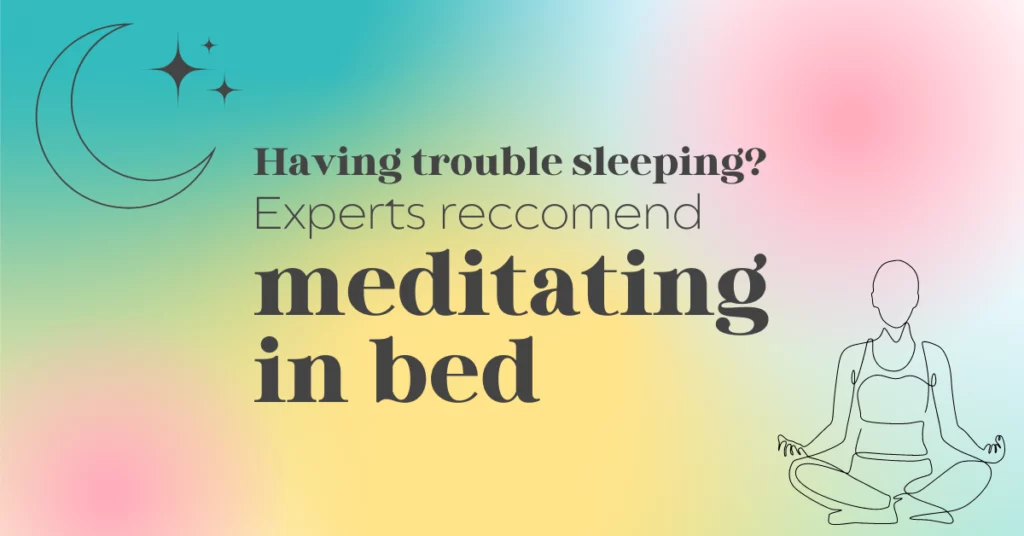Catch up on “beditating”—a portmanteau of “bed” and “meditating.”
Yet another long night of relentlessly counting sheep? Worry not, my fellow night owl. I have a new technique that can help: meditating in bed. Now before you roll your eyes, hear me out, okay? I have been an insomniac for most of my adult life, and I’m here to share my experiences. Plus, I have meditation insights from an expert you don’t want to miss.
When stress, anxiety, or depression pile up, it can lead to bad sleep habits. Almost anything can be a trigger. Finances are a common stressor, as are family and work. Finances alone – 46% of women and 38% of men stress about their finances. Anxiety can lead to sleepless nights. Availing cash advance loans online could be a quick solution to short-term financial stress. But there are other actions that can help manage and reduce stress, regardless of the cause.
The National Sleep Foundation recommends 7 to 9 hours of sleep every night for adults. However, not many of us hit that range. Modern life is inherently stressful. People have careers, families, day-to-day chores, and beyond. Fatigue and exhaustion are rampant among most professionals and that’s why burnout is fairly common.
Whether you are a chronic insomniac or recent life events have triggered sleepless nights, meditating in bed could be helpful.
If you have never tried meditation, you’re probably wondering if it’s even worth looking into the practice. Let me assure you, it’s certainly worth your time. For starters, there are 200-500 million meditators worldwide because it has a plethora of benefits.
We reached out to meditation expert Hannah Knapp, cofounder of WITHIN Meditation. She shares, “I often tell my students, we don’t meditate to get really good at meditating. We meditate so that we can live our lives more fully.” We couldn’t agree more!
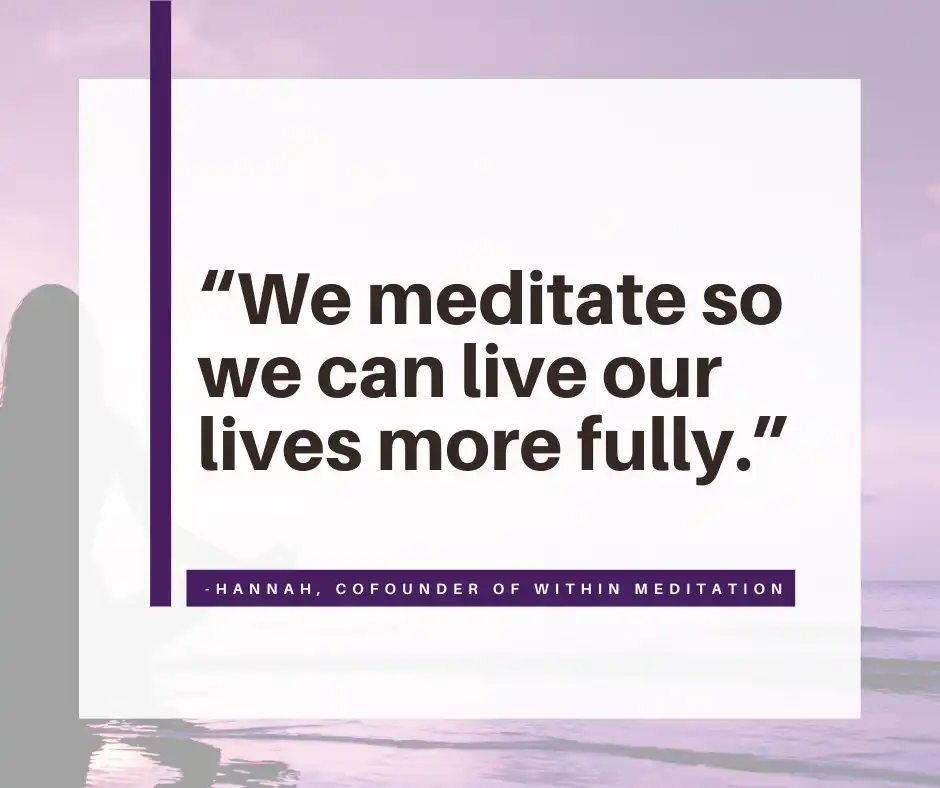
Hannah adds, “As humans, our minds are constantly occupied with the future, the past, and opinions… a little bit of that is helpful, so we can plan ahead and we can learn from what we experience… [when] we overdo it, we experience stress, anxiety, and depression.”
Benefits of meditation
When I consider trying out something new, I always investigate how it would potentially benefit me. I’m drinking green juice because it can supposedly give me flawless skin. I got myself an air fryer because oil-free cooking is generally healthier. When I meditate, it’s because of the many proven benefits.
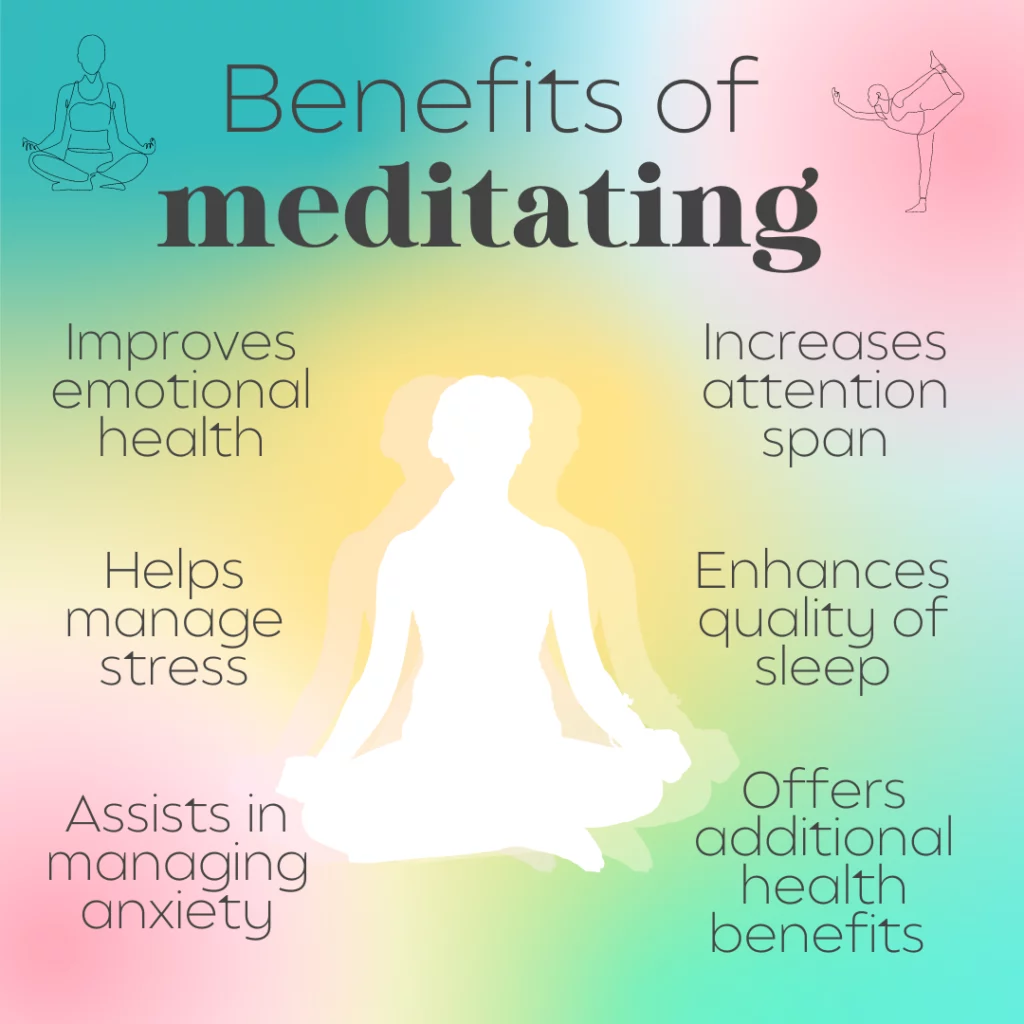
1. Helps manage stress
Meditation is widely regarded as a relaxation technique. It is often used to manage stress. In fact, 84% of people use meditation to lower stress and anxiety. Research shows that people who use meditation are able to reduce stress-induced conditions. This includes irritable bowel syndrome and post-traumatic stress disorder. 73% of veterans with PTSD have reported a reduction in symptoms. When I find myself in stressful situations, I always make it a point to meditate for a few minutes.
Hannah explains, “[With meditation] we’re not worrying or feeling anxious about the future; we’re not agonizing over things that happened in the past; and we’re not judging ourselves or our experience as good or bad.”
2. Improves emotional health
It is observed that meditation could contribute to developing a positive outlook. People have reported having fewer negative thoughts and an improved sense of self-image. Having an overall positive emotional state leads to enhanced emotional and mental health.
3. Assists in managing anxiety
According to Disturb Me Not, meditation can help reduce anxiety 60% of the time. Lower stress levels lead to less anxiety and that’s what meditation can help achieve. Along with meditation, practicing yoga has also shown positive effects in stress management. If you’re wondering how to meditate in bed for anxiety, let me share that I used to struggle with crippling anxiety, and still do, but meditation has helped me better manage it.
4. Increases attention span
There are forms of meditation that help improve one’s focus, concentration, and attention span. It is believed that meditation can increase attention span in as little as four days. Students and professionals along with other individuals can benefit from a longer attention span. Meditating regularly helps me be more present at work and around my family.
5. Enhances quality of sleep
Getting quality sleep is vital. Several adults struggle with getting enough sleep. Disturb Me Not reports that 91% of insomniacs that tried meditation were able to lessen or completely forgo their medication. As a new parent, I don’t get 8 hours of uninterrupted sleep. However, meditation helps me get better quality sleep.
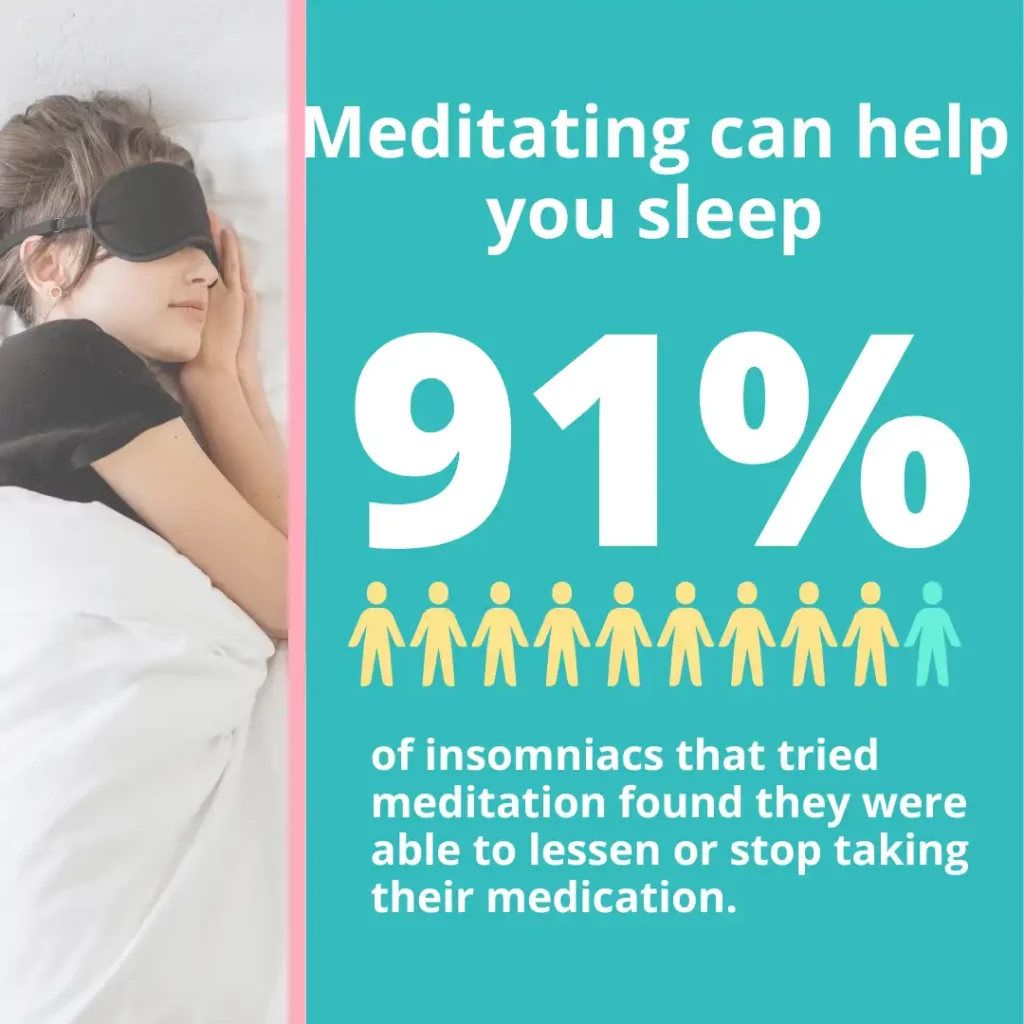
6. Offers additional health benefits
Studies suggest that meditation may help lower blood pressure and aid in pain management. It is also believed to reduce the risk of depression while improving general well-being. Meditation has been found to decrease blood pressure 80% of the time, according to Disturb Me Not.
“Beditating” explained
Believe me, when I first heard the term “beditating,” I immediately assumed it was a new fad. Just look around us: Our culture is always obsessed with “shiny new things”!
On second thought, beditating actually makes sense. I found myself thinking, “Can you meditate in bed?” I figured, why not! Meditation is a relaxation technique, and I find myself most relaxed in a horizontal position as opposed to sitting upright.
Is it ok to do meditation in bed?
Absolutely! I prefer it over sitting down any day! Honestly, I don’t see why you should not meditate in bed.
Think about the physical impact. Meditating in bed can help us fall asleep because it relaxes our body, clears our mind, and slows our breathing. Plus, it can be added to any preset bedtime routine. These things together can help trick our body into feeling sleepy. Beditating is a wonderful way to fall asleep faster and get a better night’s sleep.
Meditating in bed involves lying down, muscle relaxation, and deep breathing. Some people use white noise to achieve a state of calmness while others rely on various meditation apps to guide them. It helps you slowly fall asleep. I’d recommend comfortable clothing, a quiet and dark setting, and a nighttime routine to get you started.
Different people have different nighttime rituals that they practice before going to bed. Self-care at the end of a busy day can help boost sleep quality. That’s why it is important to include self-care rituals in your nighttime routine. Personally, I have benefitted a lot from journalling and I urge you to try it as well. I have chalked out a nighttime routine that should work for most individuals. Hopefully, following a routine every night will train your mind and body to fall asleep sooner.
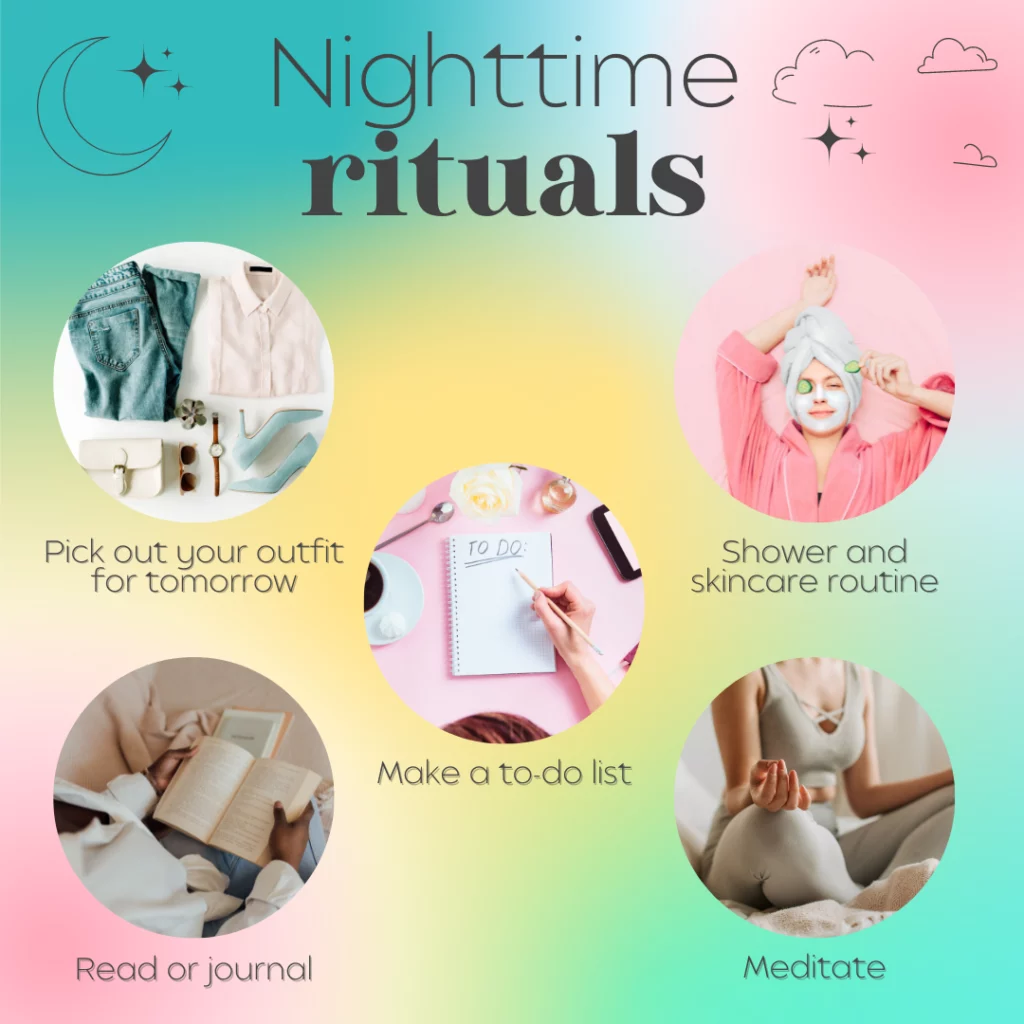
How do you meditate in bed
You could lay in bed for your reflection period. Or, you could try a few common yoga poses.
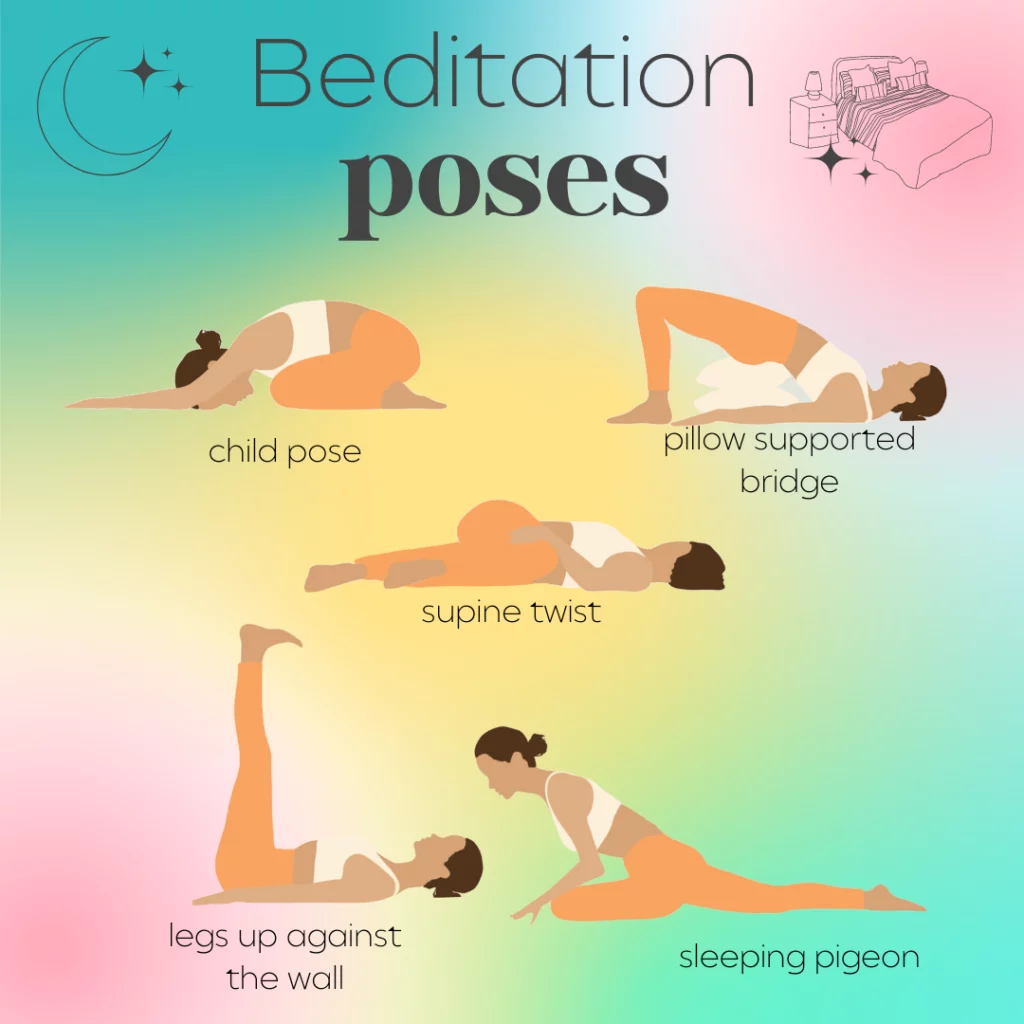
These poses are perfect to softly stretch your limbs and relax your body before bed. You’ll want to aim for a slight stretch here. If you feel pain, you’re doing it wrong.
Below are some very easy-to-do steps that demonstrate how to meditate in bed for beginners.
- Put away distractions like your phone and other devices.
- Lie in bed in a comfortable position.
- Breathe slowly and deeply.
- Focus on your breathing and try to relax your body.
- If you find your mind wandering, try to refocus on your breathing.
It takes time and practice to meditate for longer than a few minutes. As you get more and more experienced, you will discover that you can calm your mind and achieve a state of complete relaxation.
Meditation expert Hannah states, “Mindfulness meditation is all about paying attention to the present moment, without judgment.” She continues, “When we practice doing that on a regular basis, we’re radically changing our relationship to life.”
Although we’re focusing on beditating as a means to fall asleep, it can be done any time during the day, in case you’re thinking of how to meditate in bed in the morning.
Time for a snooze fest!
I mean that quite literally—snooze fest. Now that you are armed with knowledge and information, the next step is to practice the same. Don’t be disheartened if you don’t see instant results.
Hannah concludes, “Even if we only meditate for a few minutes at a time, we’re planting the seeds of change. That’s why mindfulness meditation can be such a powerful way to address mental health challenges—because it helps us undo the ingrained thought patterns that are causing them.”
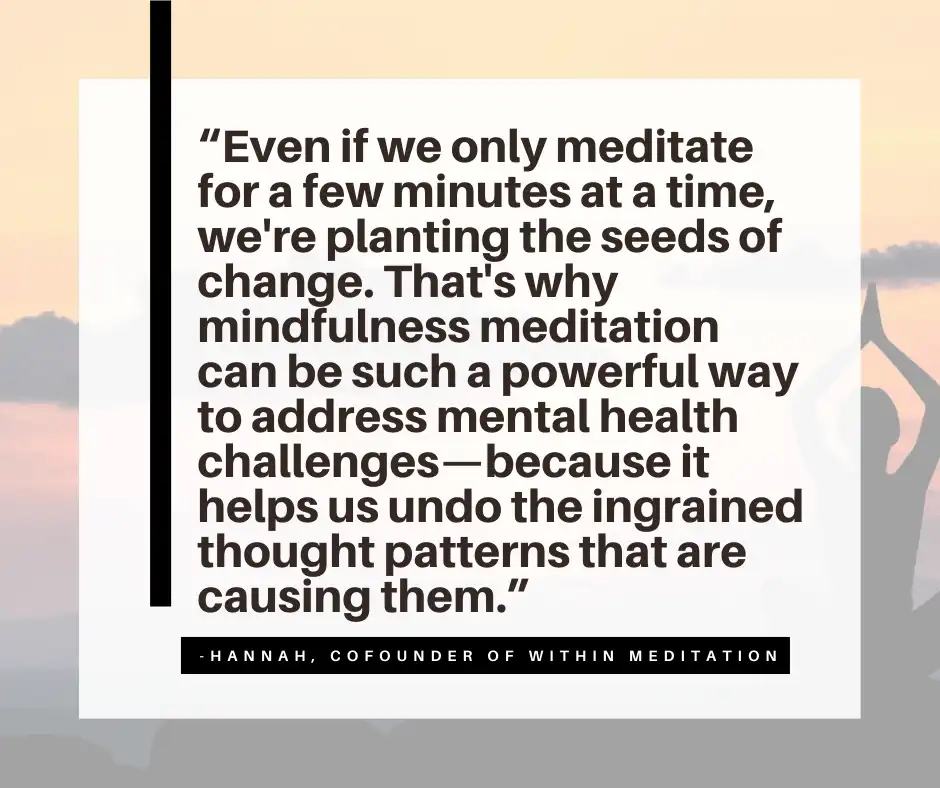
Meditating in bed or meditation in general isn’t a quick fix like coffee or energy drinks! Think of it as a long-term investment in your mental and emotional health. Be consistent in your efforts and soon enough you’ll be seeing the results.
Nama-stay in bed!
